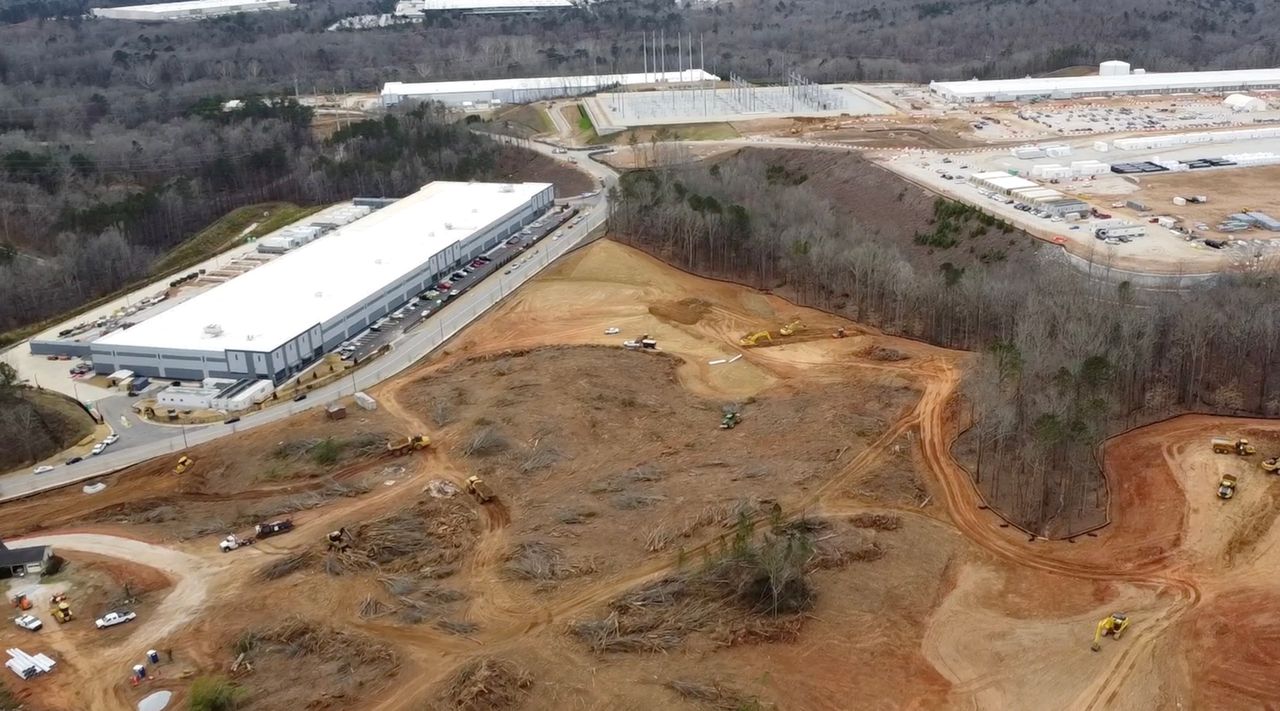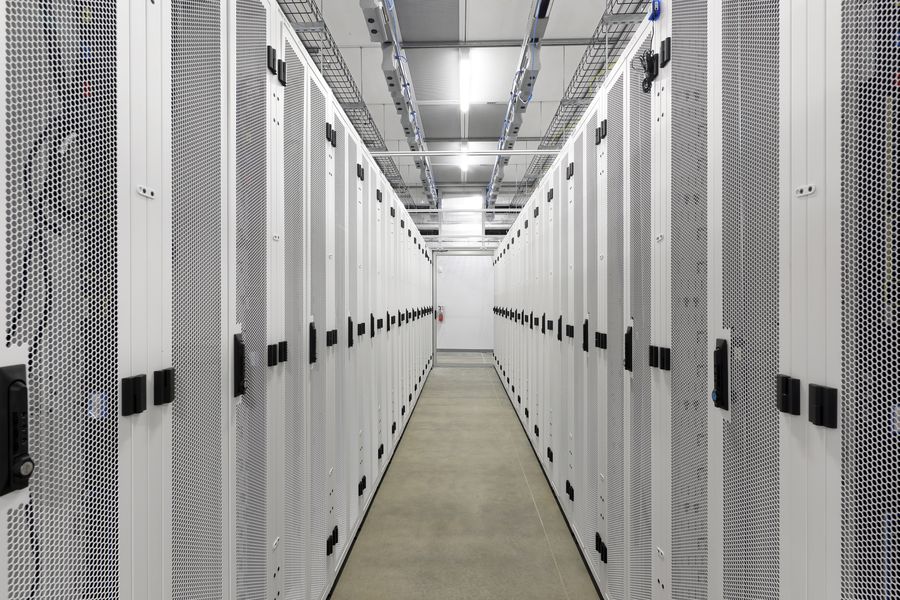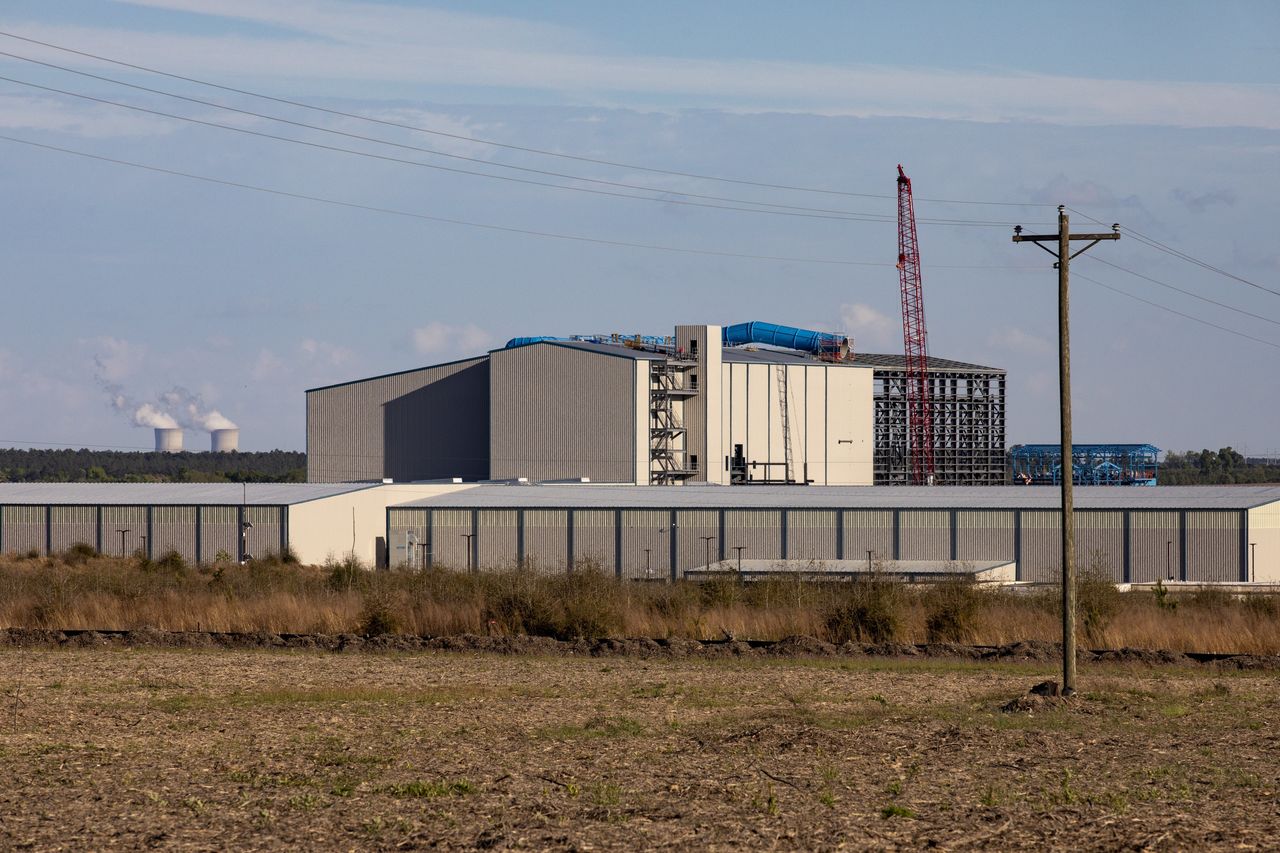There’s Not Enough Power for America’s High-Tech Ambitions
ATLANTA—Bill Thomson needs power fast. The problem is that many of the other businesspeople racing into Georgia do too.
Thomson heads marketing and product management at DC Blox, which in recent years built a string of data centers in midsize cities across the fast-growing Southeast. The company more recently set its sights on Atlanta—the would-be capital of the region—joining a slew of tech and industrial firms piling into the state.
Vying for a piece of one of America’s hottest markets, those businesses tend to have two things in common. One is that they represent a U.S. economy increasingly driven by advanced manufacturing, cloud computing and artificial intelligence. The other is that they promise to hoover up huge amounts of electricity.
That combination means Georgia’s success in luring this development comes with a side effect: Power is a big source of tension. The clean-energy goals of companies and governments are running up against the need for projects to break ground fast. So far, climate advocates fear the imperatives of growth mean more fossil fuels.
Georgia’s main utility, Georgia Power, has boosted its demand projections sixteen-fold and is pushing ahead on a hotly contested plan to burn more natural gas. Critics warn it will yield higher bills and unnecessary carbon emissions for decades. Some companies are scrambling to secure bespoke renewable-energy deals to power their development.
One major source of disruption is data centers. The facilities are ballooning in size as people spend more of their waking hours online and companies digitize everything from factory processes to fast-food drive-throughs. All that computing requires power—and for firms like DC Blox to lock it in as quickly as possible.
“Generally,” Thomson said, “we find the guys with the fastest power win.”

Similar quandaries are rippling through other hubs of the new American economy, with utilities in Tennessee and the Carolinas forecasting their own unexpected surges in load growth. U.S. power usage is projected to expand by 4.7% annually over the next five years, according to a review of federal fillings by the consulting firm Grid Strategies. That is up from a previous estimate of 2.6%.
The projections come after efficiency gains kept electricity demand roughly flat over the past 15 years, allowing the power sector to limit emissions in large part through coal-plant closures.
“We haven’t seen this in a generation,” said Arne Olson, a senior partner at consulting firm Energy and Environmental Economics. “As an industry, we’ve almost forgotten how to deal with load growth of this magnitude.”
For states like Georgia, the fear is missing out on what could be once-in-a-generation investments. Wall Street is salivating over an artificial-intelligence-fueled tech bonanza, while Washington is throwing billions of dollars into domestic manufacturing.
The added wrinkle is that it is all happening as many parts of America—corporate America included—are trying to wean themselves off fossil fuels.
“These companies all have clean-energy goals,” said Patty Durand, a Georgia Power critic who is campaigning to be a utility regulator in the state. “Those goals are at risk if Georgia Power gets what it wants.”
The Peach State’s energy quandary stems from the type of economic dynamism that many counterparts would envy. Its growth has consistently outpaced the nation’s. A smaller portion of Georgians are jobless than the U.S. average, while their incomes tend to be rising faster.
State and local economic-development teams have courted large businesses to set up shop with sales pitches that have included generous financial incentives. Rail lines, ports and America’s largest air hub also provide access to faraway customers.
Pat Wilson, commissioner of the Georgia Department of Economic Development, said energy is increasingly part of those discussions with newcomers. Officials tout the newly expanded Plant Vogtle, America’s largest nuclear power plant, as a sign the state is ready for long-term growth.
“We have a utility partner to make sure you can meet your energy needs on day one,” Wilson said.
Those needs include affordability, reliability and sustainability for firms like Aurubis, a German metals giant building a recycling plant in the outskirts of Augusta.
U.S. energy prices are far lower than those in Europe. That is a boon for Aurubis, which uses mammoth equipment to shred old circuit boards and electrical wiring, melt the scraps, and separate copper from other materials.

The company also boasts aggressive emissions-reductions targets for its power-intensive smelters. At its roughly $820 million Georgia plant, Aurubis will use up to 31 megawatts of electricity, enough to power thousands of homes.
“Not every project itself has to reduce carbon emissions,” said David Schultheis, president of the Georgia facility. “But the overall set of projects has to guide us there.”
The firm has made strides to that end in Europe by bolstering its usage of wind or solar power in a portfolio stretching from Belgium to Bulgaria. In Georgia, Schultheis pointed to Plant Vogtle, visible just 12 miles away, as a symbol of reliable energy.
Companies prize nuclear power plants, since they produce carbon-free energy and—unlike wind or solar power—don’t depend on the weather. But the projected power needs of new businesses in the state far exceed the expected output of the plant’s recently added reactors, the second of which went online last month.
Despite Aurubis’ proximity to Vogtle, which is co-owned by Georgia Power, it is also difficult to trace the source of electricity that reaches the substation on the German company’s property nearby. Schultheis instead relies on the utility’s overall power production for his carbon accounting, meaning the Georgia site will add more to Aurubis’ carbon footprint.
“We get the full grid—the mix of the grid—of what they produce,” he said.
Many of the battles over that energy mix have been fought in a windowless room in one of the imposing government buildings crammed into Atlanta’s South Downtown area. That is home to meetings of the Georgia Public Service Commission, which oversees utilities including Georgia Power.
The investor-owned utility last fall made an unusual update to its periodic resource proposal to regulators. Citing a boom in new business customers, Georgia Power boosted its projected demand growth over the next seven years from less than 400 megawatts to 6,600 megawatts, or about a third more than the utility’s total capacity at the beginning of 2023.
To make up the gap, the company put forward a plan that includes adding battery storage, buying power from fossil-fuel-burning plants in Mississippi and Florida, and building three new gas-fired turbines in Georgia.
The Southern Co.subsidiary has since sparred with renewable-energy-minded organizations as divergent as local municipal governments, the Sierra Club and the Pentagon.
Opponents argued the utility should accelerate demand-side responses, such as allowing customers to dial down energy usage depending on costs. Others proposed more-aggressive use of solar power and batteries, or so-called “virtual power plants” that allow consumers with solar panels to sell energy back to the grid.
In Georgia Power’s view, adding gas is key to providing stable power and quickly ramping up electricity for moments of peak usage on the hottest days of summer and coldest days of winter. That is especially crucial given the utility’s gradual retirement of coal-fired plants.
The state is attracting so many power users, Georgia Power contends, that new investments will actually suppress ratepayers’ bills.
“We anticipate that we will not need to increase rates to cover the costs of these resources that we’re adding,” said Aaron Mitchell, the company’s vice president of pricing and planning.

Some Georgians are skeptical, noting utilities’ previous overestimates of demand growth. Power companies have a financial incentive to pursue capital projects, critics say, and overbuilding now would risk saddling ratepayers with assets that have decadeslong shelf lives.
The recent history of energy development in the state has also been rocky. The Georgia Power-led project to expand Plant Vogtle, the first U.S. nuclear development in decades, ran up more than $30 billion in costs and lagged years behind schedule.
Since the project’s early stages in 2007, the 12-month moving average of residential power costs for the utility’s customers has surged 68%, according to the Georgia Center for Energy Solutions. That outpaced inflation, as well as cost increases for industrial and commercial customers.
Price pressures and climate fears have pushed communities such as suburban Atlanta’s DeKalb County, which has pledged to slash emissions, to lobby regulators for more aggressive oversight of the investor-owned utility. Ted Terry, a DeKalb County commissioner, warned that the state is using a 20th-century energy playbook while trying to attract 21st-century industries.
The state’s energy market “is not working for all of us,” Terry said. Regulators approved much of Georgia Power’s plan on April 16.
‘Essential to our economy’

The tension hasn’t slowed businesses’ rush to the state.
Alphabet’s Google has operated data centers in Georgia for more than two decades, gradually expanding its footprint. In 2021, Microsoft established a new U.S. data-center region emanating from greater Atlanta. An Amazon Web Services spokesman said the firm recently bought land in the Peach State and is evaluating possible server-farm locations.
All three firms purchase massive amounts of renewable energy to help power their facilities around the world. All three are also members of the Clean Energy Buyers Association, a trade group pushing utilities, including Georgia Power, to go green.
Priya Barua, the organization’s senior director of market and policy innovation, said the added difficulty in much of the Southeast is that traditionally regulated power markets sometimes give firms fewer opportunities to shop around for wholesale electricity.
“They’re more limited in how they can get clean energy,” she said.
Some analysts believe that could change as companies exert more pressure on regulators and developers strike deals with independent power producers. As part of Georgia Power’s recent planning update, the utility said it would work with trade groups like Barua’s to explore how commercial and industrial customers might build or contract their own clean-energy projects in the future.
Those setups have been confined in recent years to nonprofit electricity cooperatives that tend to serve rural areas. Instagram-owner Meta, for example, joined with a Georgia co-op and solar developer Silicon Ranch as part of a broader deal to power data centers.
But even in a more-competitive market, those deals may remain out of reach for most companies, such as DC Blox, the data-center operator building two facilities on opposing outskirts of Atlanta.
Founded in 2014, the firm constructed its first data center in an old paper plant in Chattanooga. Power usage: one megawatt. DC Blox has since built out a network from Myrtle Beach, S.C., to Huntsville, Ala., leasing space to municipalities, universities and manufacturers.

Now, the company is big-game hunting for big-tech customers. The larger of its two Atlanta-area sites could reach up to 300 megawatts.
“The smart states and smart utility commissions are going to figure out how to do this because this isn’t going to stop,” said Thomson, the DC Blox executive. “AI is coming next.”
DC Blox executives see themselves as part of Atlanta’s evolution from logistics center to the digital hub of the Southeast. Nowhere is that more apparent than west of the city in Douglas County, the most sought-after corner of the region’s data-center market.
Local officials including Chris Pumphrey, president of the public-private Elevate Douglas Economic Partnership, began seeking out data centers about a decade ago. While the facilities employ few full-time employees, operators and tenants pour property and sales taxes into public coffers. Another benefit to Douglas County was that the new industry reduced truck traffic to warehouses peppering the area.
“At that period of time,” Pumphrey said, “there wasn’t this significant concern about energy.”
These days, Douglas County is home to current or forthcoming data centers by companies including Google, Microsoft, DC Blox, Flexential and Switch. As hundreds of construction workers etch the concrete structures into sides of hills like fortresses, Pumphrey is eagerly awaiting the payoff.
“They’re essential to our economy,” Pumphrey said. As for the energy concerns, he added, “We have to figure something out.”

Write to David Uberti at [email protected]
